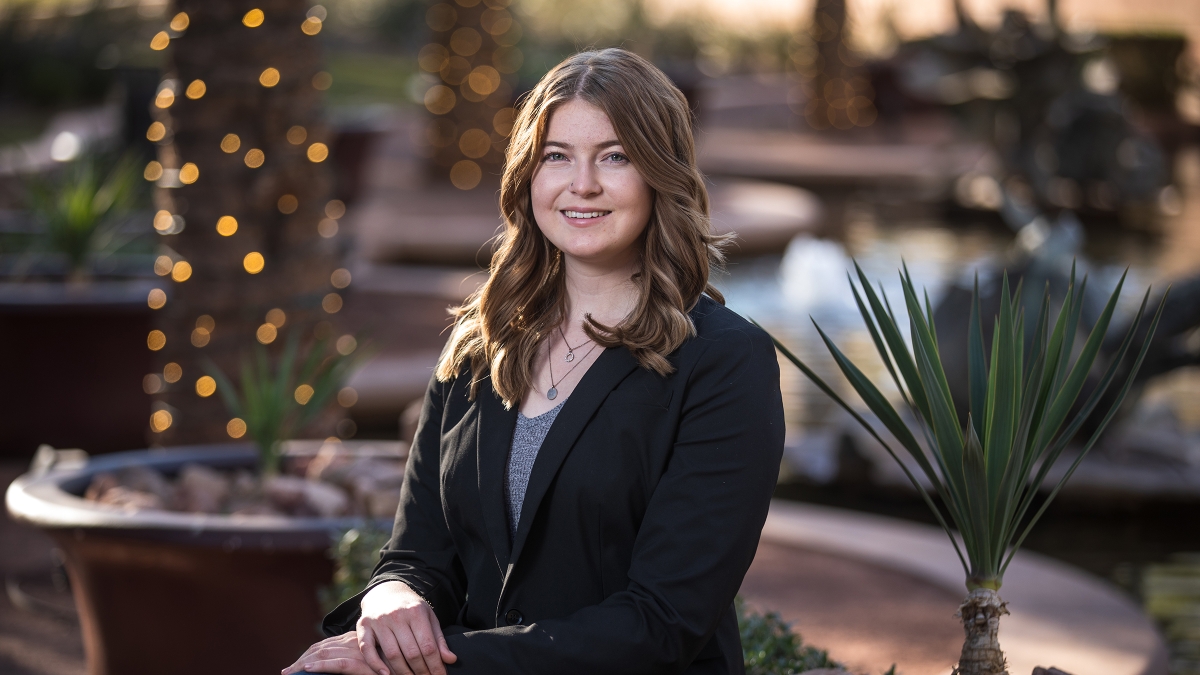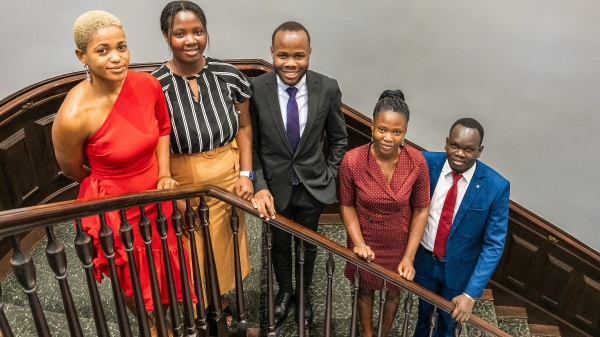ASU Thunderbird grad prepares to globalize her management career with a humanist focus

Thunderbird graduate Makenna Flynn plans to pursue her master’s in management in the school’s 4+1 program. Photo by Charlie Leight/ASU Now
Editor's note: This story is part of a series of profiles of notable fall 2020 graduates.
Before attending the Thunderbird School of Global Management at ASU, Makenna Flynn had already started developing a global mindset and empathy skills through her work at a local refugee resettlement office.
She expanded her worldview by listening to the stories of struggle, triumph and tragedy shared there by refugees and employees. Flynn learned about the adversity that caused them to flee their home countries, places such as Iraq, Myanmar, Afghanistan, El Salvador and Somalia — where poverty and violence have turned many citizens into refugees in recent years.
When Flynn relayed to her adviser at Paradise Valley Community College how she felt hearing these stories, he suggested a Thunderbird at ASU program. Flynn did some research on the school and says she immediately felt connected. She chose ASU with the goal of earning a Thunderbird master’s degree after completing her undergraduate studies.
As a first-generation college student, Flynn was elated with the expanded learning opportunities outside the classroom. She spent a month in Argentina immersing herself in the culture and gathering more stories from residents. She saw the impact of globalization on a traditional culture, allowing her to contextualize what she was learning in the classroom and deepening her understanding of the dynamics of the global economy.
Flynn is a recipient of an ASU Young Alumni Scholarship, APS Scholarship and a Lentz Scholarship. She will continue her studies at ASU after graduation to earn her Master of Global Management in one year instead of two through Thunderbird’s 4+1 program.
She hopes to work in storytelling marketing in a social enterprise or business that makes a positive impact in its communities. Flynn will continue to collect and share stories about people from all over the world, narratives that she believes create the new human connections needed to build inclusive, sustainable prosperity in international communities through global cooperation.
Question: What was your “aha” moment, when you realized you wanted to study the field you majored in?
Answer: In high school, I participated in a leadership program called the Hugh O’Brian World Leadership Congress (WLC). During this weeklong congress, one of the days was spent learning about major global issues. I heard professors speak about the right to an education and learned more about the global refugee crisis. After the mini courses, I felt the need to educate myself further and find out how to make a positive difference. And the more I researched, the more I realized the opportunities available for businesses to be that difference in the world.
Q: What’s something you learned while at ASU — in the classroom or otherwise — that surprised you or changed your perspective?
A: I have learned the importance of knowing how to manage stress. For a while, I would overload myself with extra coursework, part-time jobs and extracurricular activities without ever really taking time for myself. This past year, I have spent more time doing the activities that I love like hiking, exploring Arizona with friends, playing basketball or holding a movie night with my family. Setting aside this time to recharge has allowed me to focus more fully on my academics and professional development than before.
Q: Which professor taught you the most important lesson while at ASU?
A: My communications professor, Professor Kenneth Kunkel, taught me the importance of not tying my sense of self-worth to my grades. When I entered his class, I would be so focused on trying to get the “A” that I would often miss out on the creative side of public speaking. It wasn’t until my advanced public speaking class where I realized my strength as a speaker lies in creating unique content, not simply following the rubric and adding no personal material.
Q: What’s the best piece of advice you’d give to those still in school?
A: Explore various interests, especially in your undergraduate degree. While my major was global management, I spent my electives exploring world philosophies, developing my public speaking skills, learning about astrology and other hobbies of mine. This interdisciplinary education gave me a much richer perspective in my core business coursework.
Q: What was your favorite spot on campus, whether for studying, meeting friends or just thinking about life?
A: My favorite spot to study is at the West campus on the grassy area outside of the Casa de Oro residential hall. I love to roll out a blanket, turn some music on and spend the afternoon studying and hanging out with friends.
Q: If someone gave you $40 million to solve one problem on our planet, what would you tackle?
A: I would invest $40 million into producing alternatives to unsustainable development. Dams, mines and tourist attractions (among other industries) often displace Indigenous communities and negatively impact the environment. Finding more sustainable solutions will have positive impacts across sectors and for most stakeholders.
Written by Joanna Furst
More Business and entrepreneurship

Cohort of Mastercard Foundation Scholars poised to become AI leaders in Africa
Arizona State University is celebrating a significant milestone in expanding the university’s global access mission by welcoming…

Networking event turns pitches into partnerships
Perfect timing, quick decisions and electrifying energy are vital aspects of both startup ventures and auctions. In an…

Thunderbird at ASU, W. P. Carey School team up on concurrent master's degrees
Students are now able to take advantage of two world-class schools at Arizona State University, at the same time. The…